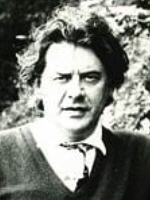The page of David Holbrook , Hungarian biography
Biography
David Holbrook was one of a remarkable quartet of socialist-minded officer conscripts who returned from the Second World War fired with the ambition and gifted with the talent to give their particular corner of the nation's education moral and egalitarian purpose, to recover the people's culture for the people, above all to make the splendours of a national literature the property of the whole nation.
David Kenneth Holbrook was born on January 9 1923 in Norwich. In his novel Going Off The Rails (2003), he would recreate the lives of his grandfather, who built wagons in the Midland and Great Northern Railway workshops at Melton Constable, and his father, who worked as a railway booking clerk in North Walsham but, after he was suspected of theft, moved to Norwich.
Educated at City of Norwich School, Holbrook won a scholarship to Downing College, Cambridge, where he studied for a year under FR Leavis before being called up for military service in 1942. He served until 1945 as an officer with the East Riding Yeomanry and powerfully described the horror of the D-Day landings in his first and best-known novel, Flesh Wounds (1966), in which Paul Grimmer (Holbrook’s fictional alter ego) sees lines of dead bodies under burning tanks .
In 1945 Holbrook returned to Downing to complete his degree. But his true interest lay in teaching. After teaching English at a secondary modern school in Felixstowe and tutoring for the Workers’ Educational Association in East Anglia and Leicestershire, in 1954 he was appointed to one of Henry Morris’s new Cambridgeshire Village Colleges — in Bassingbourn. There he taught adults, looked after evening classes, and was given the bottom stream of children and told to do what he could with them.
Throughout his life Holbrook wrote energetically and produced more than 60 books, a couple of dozen of which appeared after his official retirement. His writing is intensely personal. His poems – published in five volumes, including Against the Cruel Frost (1963), and Object Relations (1967), as well as Selected Poems 1961-78 (1980) – are unashamedly autobiographical. They are frequently concerned with marriage and children, and with small domestic scenes.
Sources:
http://www.telegraph.co.uk/news/obituaries/8832550/David-Holbrook.html
https://www.theguardian.com/culture/2011/sep/01/david-holbrook-obituary
http://www.independent.co.uk/news/obituaries/david-holbrook-writer-and-inspirational-teacher-who-worked-towards-his-vision-of-a-national-culture-2340763.html
(Editor of this page: Répás Norbert)



